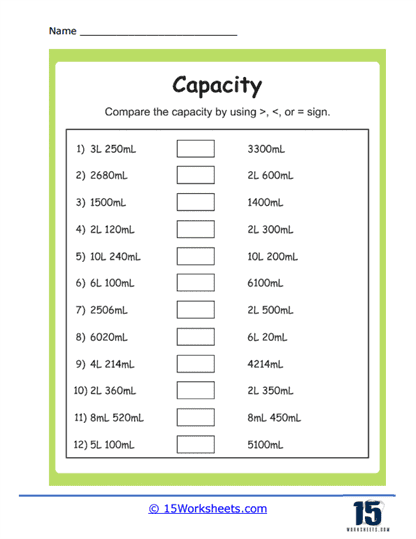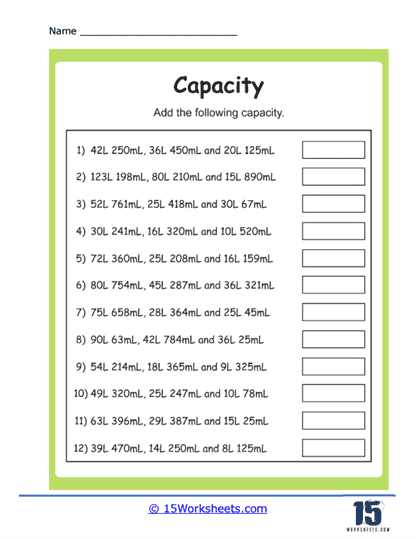Capacity Worksheets
About These 15 Worksheets
The term, “capacity”, refers to the ability of a container to hold substances, most commonly liquids like water, oil, or juice. This concept is vital for students as it lays the groundwork for understanding volume, measurements, and more advanced mathematical concepts. Capacity worksheets are specially designed instructional tools that help students comprehend and practice this idea.
These worksheets were created to teach and reinforce the concept of capacity. They contain exercises and activities to help students identify, measure, compare, and convert capacities of different containers. Generally, they use standard units of measure like milliliters (ml), liters (l), gallons, pints, or cups.
Get ready to pour some fun into your math time with this lively set of capacity s! Students begin by eyeballing and comparing containers with activities like the Glass Level and Holds More Liquid, where they’ll decide which container wins the hydration Olympics. In the More or Less Than 1L and Greater or Less Capacity , they’ll play judge and jury on which containers hold more or less than a liter-cue the dramatic math showdowns. Then it’s time to organize and rank with the Ordering Capacity, where containers compete for top spot like contestants on a math-themed reality show.
Once they’ve mastered the basics, students dive deeper into the math pool. The Comparing Capacity and Comparing Containers help sharpen those observational skills, asking students to tell which containers are big-time or small-scale. They’ll become metric magicians with the Convert Units of Capacity , flipping between milliliters and liters like pros. In the Sums of Volumes and Subtract Volume , they’ll be adding and subtracting liquids like it’s a recipe for success-just without the mess in the kitchen.
For the hands-on learners, the Cut and Paste Capacity brings an artsy twist to liquid logic, while the Estimate Capacity puts their best guesses to the test. Things get a little more brainy with the Algebraic Capacity, where students introduce variables into the mix-because even math letters want to play in the water. Finally, the Comparison Math Sentences ties it all together by having students express their liquid insights in full math sentences. Altogether, these s turn measuring into an adventure full of imagination, logic, and a whole lot of splashy learning.
The primary purpose of these worksheets is to introduce students to the foundational idea of how much a container can hold, paving the way for more advanced topics like volume and density in later grades. These worksheets vary in complexity, from basic exercises suitable for younger learners to more challenging tasks for older students.
Types of Exercises on These Worksheets
Identification Exercises – These are introductory exercises that expose students to various containers and their capacities. Students may be shown pictures of different containers (like a jug, a bucket, a glass, etc.) and asked to match or label them with the correct capacity. This familiarizes students with common containers and their associated capacities. Helps in building a mental picture of the volume associated with each unit of measurement.
Comparison Exercises – Here, students might be given images or descriptions of two or more containers and asked to determine which has a greater or lesser capacity. Alternatively, they could be provided with a set of containers and asked to order them based on their capacities. This teaches students to estimate and compare capacities visually or based on given data. This aids in developing spatial reasoning
Fill and Empty Exercises – These exercises present students with scenarios where containers are being filled or emptied. For example, “If a jug has a capacity of 2 liters and you pour out 500 ml, how much remains?” This reinforces the concept of subtraction and addition within the context of capacity. It also lays the groundwork for more advanced topics like conservation of volume.
Conversion Exercises – A crucial skill for students is the ability to convert between different units of capacity. Students might be asked to convert 3 liters to milliliters or vice versa. This can get more complex with older students who might be introduced to imperial units like gallons and pints. This enhances a students’ flexibility in thinking about capacity by understanding the relationships between different units of measurement. This is essential for practical applications in everyday life and more advanced scientific studies.
Practical Measurement Tasks – These are hands-on exercises where students might be asked to measure the capacity of a container using tools like measuring cups. For instance, “Fill the cup with water and determine how many times you need to fill and empty it to completely fill a 1-liter bottle.” This offers practical, tactile experience with capacity, reinforcing abstract concepts with concrete actions.
What is Capacity?
Capacity is the measure of how much a container can hold-most often referring to liquids, but it can also apply to anything that fills space, like grains, air, or even abstract things like data. At its core, capacity is about potential. It asks: If I were to fill this cup, jug, or tank to the brim, how much would it take? It’s not about what is currently inside, but what could be inside-the full extent of what something can hold. This distinction is small but profound, especially when teaching young learners. It shifts the focus from observation (“what is”) to possibility (“what could be”), which is a powerful way to stretch not only their math skills but their thinking.
Mathematically, capacity is measured using units like liters (L) and milliliters (mL) in the metric system, or gallons, quarts, pints, and cups in the customary system. But it’s more than just conversions and comparisons. Teaching capacity involves developing an intuitive sense of volume-learning to estimate, to compare, to visualize. It helps students understand the world around them in more tangible ways: why a tiny medicine bottle and a giant milk jug have vastly different roles, or how much water it really takes to fill a swimming pool. Capacity opens up conversations about conservation, fairness, even engineering. It’s a topic that bridges the physical and mathematical, helping students not just do math, but see it-and feel it-in action.















